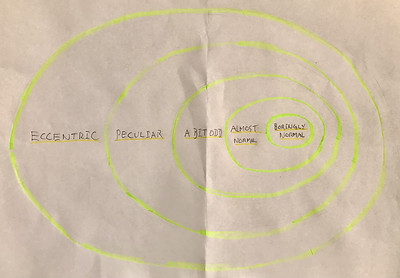Eccentric Orbit
All models are bunk, and all online tests for positioning oneself within those models, even more so. But they can be fun. I like to think my British Eccentric Test was fun, but one thing it never had was a groovy chart to illustrate its model. Now, fifteen years later I provide one, thanks to a few spare moments of doodling between work sessions. This is how the boringly normal, the almost normal, the bit odd, the peculiar and the eccentric are all arrayed.
I quickly rejected the use of a spectrum because one dimension is boring. Besides, there will be far more variation among eccentrics than among those who are normal. The test only has so many questions but if more were asked we would find many more eccentric directions to take, hence I drew a set of concentric circles with normality at the centre. I gave more space to successive shells to reflect greater variety within each. What this suggests is that there can be greater difference between two eccentrics than between an eccentric person and a normal person.
Next thing I did was to turn the circles into ellipses. Initially this was just a private joke about eccentric orbits but I soon ascribed meaning to it. It bulges to one side so that the seeming centre is off-centre. This gets away from the notion that normality is necessarily the happy medium. "A little nonsense now-and-then is relished by the wisest men" as Willy Wonka says.
Finally, to draw the ellipses, I used diffuse and transparent highlighter, rather than sharp and opaque pen, because the divisions between groupings are arbitrary, and the most flawed aspect of such models. If two of us stand only just to either side of a line then we are hardly different at all.

I quickly rejected the use of a spectrum because one dimension is boring. Besides, there will be far more variation among eccentrics than among those who are normal. The test only has so many questions but if more were asked we would find many more eccentric directions to take, hence I drew a set of concentric circles with normality at the centre. I gave more space to successive shells to reflect greater variety within each. What this suggests is that there can be greater difference between two eccentrics than between an eccentric person and a normal person.
Next thing I did was to turn the circles into ellipses. Initially this was just a private joke about eccentric orbits but I soon ascribed meaning to it. It bulges to one side so that the seeming centre is off-centre. This gets away from the notion that normality is necessarily the happy medium. "A little nonsense now-and-then is relished by the wisest men" as Willy Wonka says.
Finally, to draw the ellipses, I used diffuse and transparent highlighter, rather than sharp and opaque pen, because the divisions between groupings are arbitrary, and the most flawed aspect of such models. If two of us stand only just to either side of a line then we are hardly different at all.

Labels: Images, Philosophical

